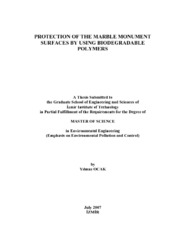Please use this identifier to cite or link to this item:
https://hdl.handle.net/11147/3965Full metadata record
| DC Field | Value | Language |
|---|---|---|
| dc.contributor.advisor | Sofuoğlu, Aysun | - |
| dc.contributor.author | Ocak, Yılmaz | - |
| dc.date.accessioned | 2014-07-22T13:52:50Z | - |
| dc.date.available | 2014-07-22T13:52:50Z | - |
| dc.date.issued | 2007 | - |
| dc.identifier.uri | http://hdl.handle.net/11147/3965 | - |
| dc.description | Thesis (Master)--Izmir Institute of Technology, Environmental Engineering, Izmir, 2007 | en_US |
| dc.description | Includes bibliographical references (leaves: 72-77) | en_US |
| dc.description | Text in English; Abstract: Turkish and English | en_US |
| dc.description | xiii, 89 leaves | en_US |
| dc.description.abstract | The deterioration of historic buildings and monuments constructed by marble has been accelerated in the past century due to the effects of air pollution. The main pollutant Sulphur dioxide (SO2) reacts with marble composed primarily of calcite (CaCO3), the firs step of decay which called gypsum (CaSO4.2H2O) crust is formed and this process can be accelerated when the surfaces exposed to the rain.In this study, the possibilities of slowing down the SO2-marble reactions were investigated by coating the surface of marble with some bio-degradable polymers: zein, chitosan, polyhydroxybutyrate (PHB) and polylactic acid (PLA) as protective agents.Uncoated control marbles and biodegradable polymer coated marbles were exposed at nearly 8 ppm SO2 concentration at 100 % relative humidity conditions in a reaction chamber for several days. The extent of reaction was determined by leaching sulphate from the marble surface into deionized water and measuring the total concentration of sulphate with ion chromatography (IC). Then, gypsum crust thickness, polymers % protection factor and average deposition velocity were calculated. Concurrently, the ratio and amount of calcium sulfite hemihydrate (CaSO3.H2O)and gypsum (CaSO4.2H2O) were determined by FT-IR analysis. The surface morphology of SO2 exposed marble to distinguished calcium sulfite hemihydrate and gypsum crystals were determined by Scanning Electron Microscope (SEM).The results of the study showed that SO2-calcite reaction increased in the use of zein, glycerol added zein and chitosan polymers on the surface of marble. While, PHB treated marble surfaces had 5 % increases in the protection factor. The low molecular weight PLA protection factor was 45 % after 85 days exposure. Similar results were observed when the high molecular weight of PLA used. The protection was extended to more than 90 days having 60 % protection factor. | en_US |
| dc.language.iso | en | en_US |
| dc.publisher | Izmir Institute of Technology | en_US |
| dc.rights | info:eu-repo/semantics/openAccess | en_US |
| dc.subject.lcc | TA428.M3 O151 2007 | en |
| dc.subject.lcsh | Marble--Conservation | en |
| dc.subject.lcsh | Marble--Deterioration | en |
| dc.subject.lcsh | Biodegradable plastics | en |
| dc.subject.lcsh | Biopolymers | en |
| dc.subject.lcsh | Air--Polluation | en |
| dc.title | Protection of the Marble Monument Surfaces by Using Biodegradaple Polymers | en_US |
| dc.type | Master Thesis | en_US |
| dc.authorid | TR130533 | - |
| dc.institutionauthor | Ocak, Yılmaz | - |
| dc.department | Thesis (Master)--İzmir Institute of Technology, Environmental Engineering | en_US |
| dc.relation.publicationcategory | Tez | en_US |
| dc.identifier.wosquality | N/A | - |
| dc.identifier.scopusquality | N/A | - |
| item.openairecristype | http://purl.org/coar/resource_type/c_18cf | - |
| item.languageiso639-1 | en | - |
| item.openairetype | Master Thesis | - |
| item.grantfulltext | open | - |
| item.fulltext | With Fulltext | - |
| item.cerifentitytype | Publications | - |
| Appears in Collections: | Master Degree / Yüksek Lisans Tezleri Sürdürülebilir Yeşil Kampüs Koleksiyonu / Sustainable Green Campus Collection | |
Files in This Item:
| File | Description | Size | Format | |
|---|---|---|---|---|
| T000625.pdf | MasterThesis | 7.59 MB | Adobe PDF |  View/Open |
CORE Recommender
Page view(s)
250
checked on Mar 31, 2025
Download(s)
134
checked on Mar 31, 2025
Google ScholarTM
Check
Items in GCRIS Repository are protected by copyright, with all rights reserved, unless otherwise indicated.